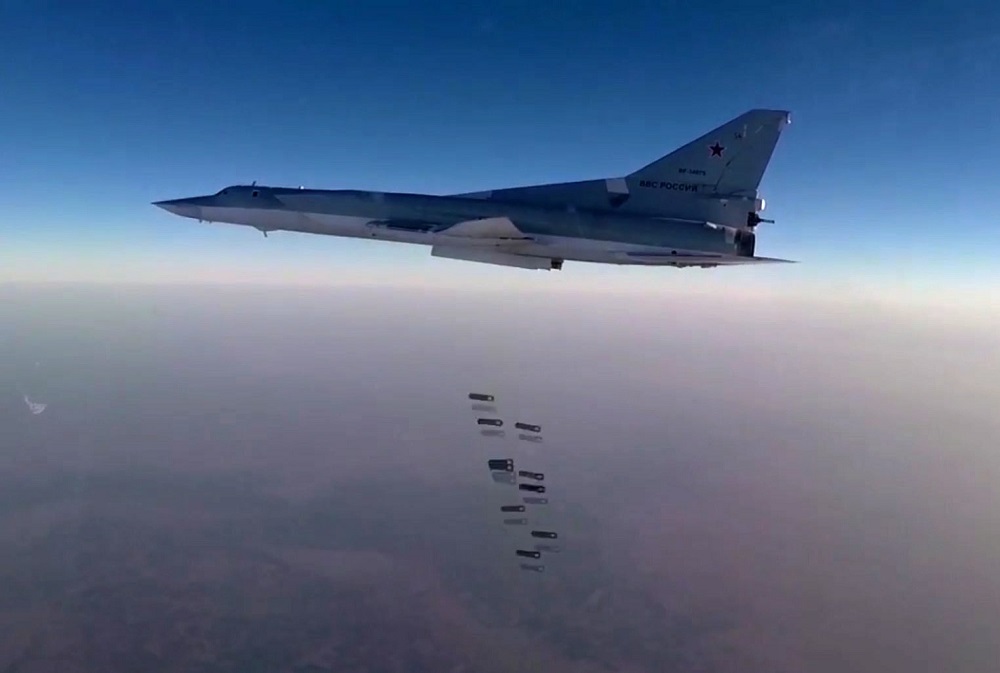Moscow and Beirut – A submarine from the Russian Black Sea fleet launched Kalibr cruise missiles against al-Nusra Front positions in Idlib, Syria, the Russian Defense Ministry announced on Friday.
The ministry said that the attack against terrorist targets came in wake of an al-Nusra Front attack on a Russian military police unit in northern Hama on September 20.
“The missile strike destroyed important command centers, training bases and armored vehicles of the terrorists, who tried to capture 29 Russian military policemen in the north of the Hama Province,” the ministry’s statement said.
Meanwhile, US Department of State accused Russian and Syrian forces of hitting civilian targets in the cities of Idlib and Hama earlier this week.
“The United States is concerned by reports of airstrikes in Idlib province and northern Hama province on September 19 and 20 that killed at least three medical personnel and damaged a number of medical facilities, emergency equipment and civil defense centers,” Department Spokesperson Heather Nauert said in a statement.
According to the US Department of State, these attacks fit a familiar pattern in which medical facilities and personnel and the civilians they serve are victims of strikes by the Syrian regime and its Russian allies.
In related news, Russian Foreign Minister Sergei Lavrov said on Thursday that recent developments in Syria call for “cautious optimism”.
Addressing the 72nd session of the United Nations General Assembly in New York, Lavrov said that even though ISIS is pulling back in Syria and Iraq, considerable additional effort is required to stabilize the region.
“It should be recalled that it is necessary to fight not only ISIS, but also al-Nusra, the latter being tolerated for whatever reason by the US coalition members,” he added.
On chemical attacks in Syria, the Russian minister stated that the alleged use of chemical weapons is a separate issue, stressing that all such cases “must be investigated honestly and professionally, without attempts to manipulate the activities of Organization for the Prohibition of Chemical Weapons (OPCW) and the UN/OPCW Joint Investigative Mechanism.
At an EU-organized conference held on the sidelines of the General Assembly, Russia’s deputy Foreign Minister Gennady Gatilov said aid was being used as a political tool to build pressure on Syrian leader Bashar Assad.
“The politicization of issues related to aid and the statements on the need to wait for the end of the political process are unacceptable,” he added.
He stressed that aid was needed now “to rebuild schools, hospitals and critical infrastructure.”
Meanwhile, Israeli jets have reportedly bombed an area near Damascus International Airport, targeting Lebanon’s “Hezbollah”.
According to social media reports, Israeli planes fired at least two missiles from outside Syrian airspace, hitting either a weapons depot or a convoy.
Opposition activists said on Friday that the overnight attacks caused destruction and damage and “the explosion shook the Damascus International Airport.”
The UK-based Syrian Observatory for Human Rights said that the shelling was heard in Damascus and its suburbs, saying that it targeted “Hezbollah” weapons caches near the international airport.
Lebanese television station al-Mayadeen also reported the attack as well as the Facebook page of the National Guard for the Defense of the Homeland.
National Guard stated that “an area near the Damascus International Airport was attacked by a hostile missile”, while images showed a fire burning in the early hours of Friday.
